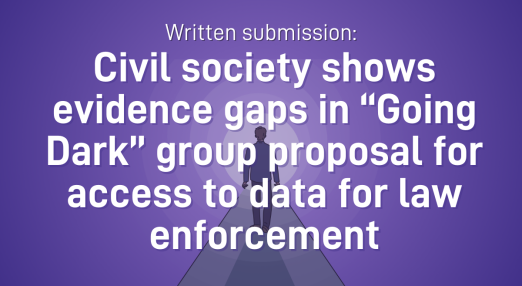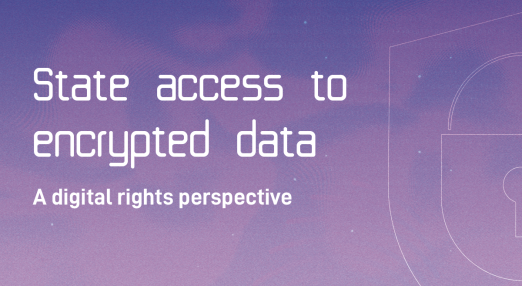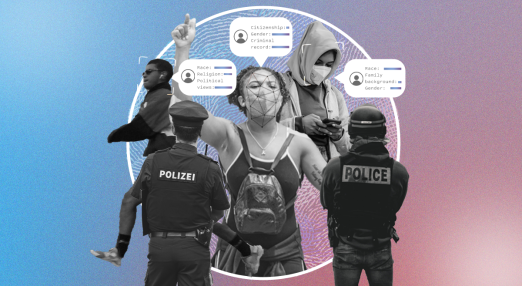law enforcement
Filter by...
-

When data never dies: How better GDPR enforcement could minimise hate and harm
Lax enforcement of the GDPR has had far-reaching consequences for many people and collectives in the EU, especially those most vulnerable. Through a story based on real life experiences of people, this blog highlights the gap between the GDPR’s promise of protection and its current reality of weak enforcement, and the opportunity EU lawmakers have with the ongoing GDPR Procedural Regulations to take bold steps to protect our data rights.
Read more
-

Written submission: Civil society shows evidence gaps in “Going Dark” group proposal for access to data for law enforcement
On 28 February 2024, EDRi and its members submitted written comments on the work of the High-Level Group (HLG) on “access to data for effective law enforcement". This HLG was set up under the Swedish Presidency of the Council in 2023 to allegedly find solutions to law enforcement ‘modern challenges’ in the digital era.
Read more
-

European Commission discusses “Going Dark”: Behind closed doors
EDRi and 20 organisations call on the High Level Group on Access to Data for Effective Law Enforcement for greater transparency and participation of all stakeholders.
Read more
-

Civil society statement: Council risks failing human rights in the AI Act
In the run up to EU AI Act trilogue negotiation, 16 civil society organisations are urging representatives of the Council of the European Union to effectively regulate the use of AI systems by law enforcement, migration control and national security authorities in the legislation.
Read more
-

EU lawmakers must regulate the harmful use of tech by law enforcement in the AI Act
115 civil society organisations are calling on EU lawmakers to to regulate the use of AI technology for harmful and discriminatory surveillance by law enforcement, migration authorities and national security forces in the AI Act.
Read more
-

Civil society calls on EU to protect people’s rights in the AI Act ‘trilogue’ negotiations
As EU institutions start decisive meetings on the Artificial Intelligence (AI) Act, a broad civil society coalition is urging them to prioritise people and fundamental rights in this landmark legislation.
Read more
-

Do you trust the police? CJEU Advocate General accepts access to phones for any type of crime
In its opinion on the Bezirkshauptmannschaft Landeck case, the Advocate General of the European Court of Justice is failing to suggest adequate safeguards for police access to our smartphones.
Read more
-

EU to provide training on “covert techniques” to abusive police forces
The European Police College is to train a host of states with miserable human rights records on the use of “covert techniques in forensics and mobile telecommunications” and will provide “training activities related to cyber-attacks in order to build capacities for law enforcement, judicial authorities and other relevant bodies.”
Read more
-

Position Paper: State access to encrypted data
EDRi’s new policy paper on encryption highlights that our privacy and security must be strongly protected, keeping into account the recent policy developments on encryption and law enforcement. Trust in communication systems is vital for our lives and connections with others. This allows us to work, socialise, organise, express ourselves, and care for each other safely.
Read more
-

Foreign authorities are banning Google and Microsoft services from schools, the Czech Republic is floundering
Jan Cibulka, a journalist for iROZHLAS and member of the Big Brother Awards CZ Jury, organised by EDRi member Iuridicum Remedium, has investigated how Czech authorities and schools are approaching the protection of privacy when using distance learning tools. Such tools send sensitive information overseas, where US law gives intelligence agencies access to it. The tools do not guarantee that children's private chats will not be accessed by, for example, teachers. While the first regional governments in Europe are developing safer alternatives, in the Czech Republic the risk assessment remains up to individual schools. In practice, they have little choice.
Read more
-

Travel surveillance: member states seek to circumvent court judgment on PNR
In June this year the the Court of Justice ruled that the rules governing the EU's system for travel surveillance and passenger profiling, set out in the Passenger Name Record (PNR) Directive, must be "interpreted restrictively" to conform with fundamental rights standards. The ruling requires substantial changes to member state practices - but the Council, in time-honoured fashion, is looking at how to circumvent it, and to ensure the greatest possible freedom of manouevre for law enforcement authorities.
Read more
-

Europol’s new powers will enable Big Data analysis and mass surveillance. We say NO!
The European Parliament is soon to vote on the new Europol reform which aims to expand the law enforcement agency’s powers without any accountability and with as few fundamental rights safeguards as possible. To influence the vote, EDRi has mobilised civil society organisations in a joint advocacy action of reaching out directly to members of the European Parliament to urge them to vote against the proposal.
Read more
